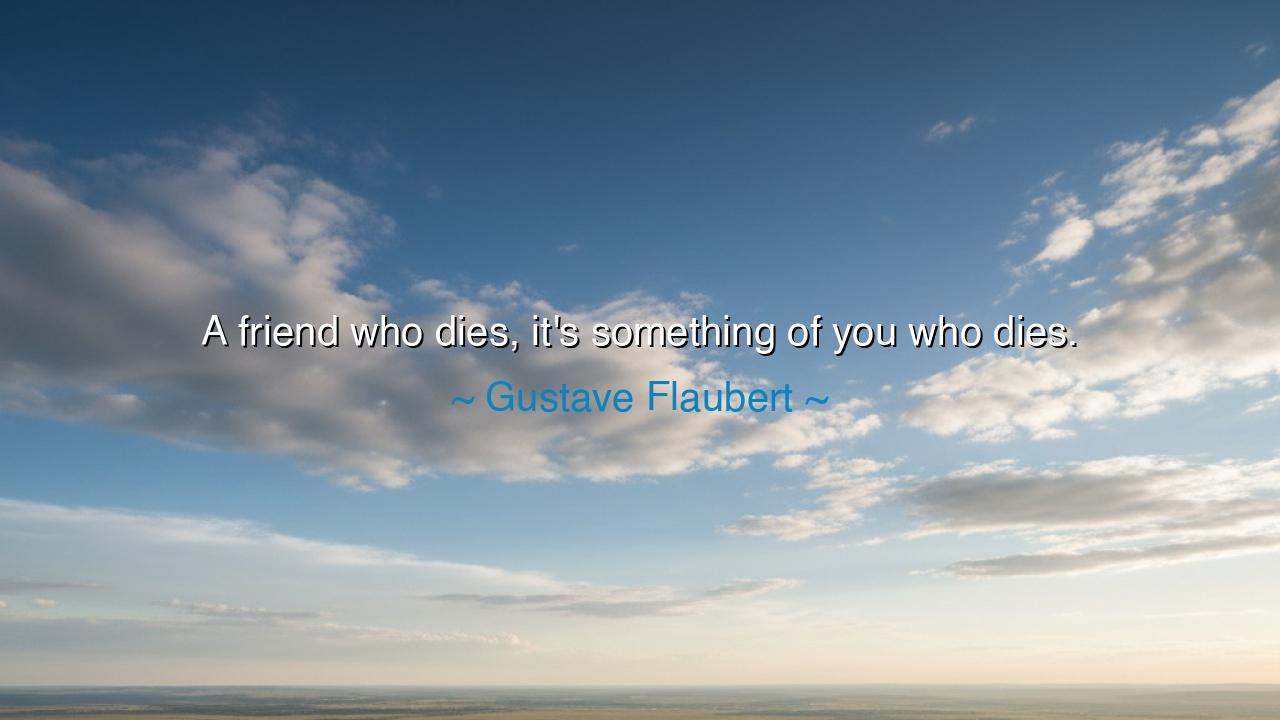
A friend who dies, it's something of you who dies.






The great French novelist Gustave Flaubert, known for his piercing insight into the human heart, once wrote, “A friend who dies, it’s something of you who dies.” In these few words, he speaks not only of grief, but of the mysterious interweaving of souls — that sacred bond by which friendship becomes part of our very being. Flaubert, a man whose own life was marked by solitude and introspection, knew the power and the pain of attachment. His words remind us that when a friend departs this world, it is not only their voice that is silenced, but a portion of our own identity that vanishes with them. For friendship, once formed, reshapes us; we carry pieces of those we love within our spirit. Thus, when death claims them, death also touches us — not in the body, but in the secret chambers of the soul.
To the ancients, such wisdom would have been spoken in reverent tones. They believed that friendship (philia) was one of the highest forms of love — a union not of flesh, but of virtue and spirit. Aristotle wrote that a true friend is “another self,” and therefore, when that friend perishes, the self is diminished. The ancients understood that friendship was not mere companionship, but a mirror through which the soul recognizes its reflection. Each friend reveals something within us that no one else can; they awaken laughter that only they could summon, courage that only their faith in us could inspire. When they die, those parts of ourselves — the memories, the laughter, the shared dreams — are sealed forever in time. Something of us dies, because something within us was only ever alive in their presence.
Flaubert’s words likely arose not from philosophy alone, but from the intimate ache of personal loss. He was a man of passion and melancholy, who loved few deeply but fiercely. His lifelong correspondence with the poet Louise Colet and his friendships with artists and writers like George Sand and Ivan Turgenev shaped his heart and his work. In his solitude, Flaubert saw that the death of a friend is not merely an external tragedy; it is an inner fracture. For when a friend dies, the world loses not only a life, but a unique perspective, a shared language, an echo of the divine that once spoke through them. Death, in this way, steals not just a person, but a world — a world that existed only between two souls.
History, too, gives us stories that illustrate this truth. When C.S. Lewis lost his friend J.R.R. Tolkien, the man with whom he had shared countless nights of conversation, faith, and imagination, he wrote in sorrow: “I feel as though a great oak has fallen, and I am left standing in the open.” In Tolkien’s death, Lewis felt part of his own life disappear — not only because of affection, but because Tolkien had drawn out parts of Lewis’s spirit that no one else could. Their friendship had been a living dialogue, a shaping force. And when one voice was silenced, the music of the other could never sound quite the same. This, too, is what Flaubert meant — that death claims not just bodies, but relationships, and in doing so, it alters the very landscape of our souls.
Yet, though his words are heavy with sorrow, there is also a tender truth of remembrance within them. For even as part of us dies with our friends, part of them lives on in us. The ancients would call this the immortality of influence — the way love plants seeds in the soul that no grave can bury. Every gesture, every word, every shared moment becomes part of our moral and emotional fabric. We carry our friends within us, as living memorials to what was most beautiful in our connection. And though we feel smaller without them, we also feel deeper, wiser, more aware of life’s fragility and grace.
The quote also carries a quiet warning. In our age of hurried exchanges and superficial connections, Flaubert’s words urge us to cherish friendship as sacred. For every true friend is a mirror, a teacher, a witness to our becoming. To neglect such bonds is to rob ourselves of part of our humanity. But to nurture them — to listen, to forgive, to celebrate, to be present — is to build the very foundation of the self. For in loving another, we expand beyond the confines of individuality; we touch something eternal. And though death may part bodies, it cannot erase the imprint of the soul upon the soul.
So, my listener, take this teaching to heart: live your friendships with depth and gratitude. Speak the words of kindness you would not want left unsaid. Forgive quickly, laugh fully, share your heart freely. For each friend is a living treasure, a piece of your own spirit made visible. And when the hour comes that one must depart — as it comes for all — do not despair as though you are utterly bereft. Mourn, yes, for something of you will have died. But also rejoice, for something of them — their love, their laughter, their light — will live forever in you.
For as Gustave Flaubert teaches, friendship binds our lives together in ways that even death cannot completely undo. When a friend dies, part of us falls silent — yet another part continues to sing, carrying both voices forward into eternity.






AAdministratorAdministrator
Welcome, honored guests. Please leave a comment, we will respond soon